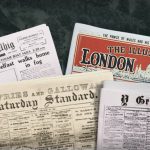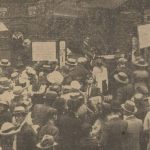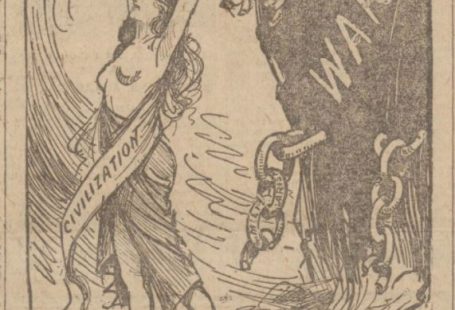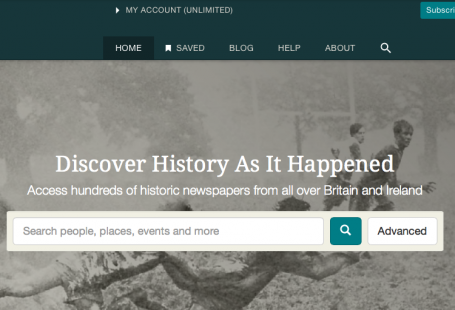Following the extension of our successful partnership with the British Library, we are delighted to announce that millions of pages will be made free to view on the British Newspaper Archive, with one million of these free to view pages made available today.
Register now to explore FREE pages
Working together over the past decade to provide the largest online collection of British newspapers, the British Newspaper Archive now hosts over 48 million pages in total, with a remit that extends beyond Britain and Ireland to cover, for example, Jamaica, India and New Zealand. Alongside regional weekly newspapers, and national dailies, sit specialist sporting, religious, political, cinema and fashion titles, all bringing history to life and telling stories from the past, which otherwise might have been lost forever.
The British Library and the British Newspaper Archive are committed to making historical resources available to more and more people, and the introduction of free to view pages marks a significant milestone in this commitment.
Now, with one million pages made free to view today, consisting of 150 titles and spanning the years 1720-1880 more and more people will be able to search the unparalleled resource which is offered by the British Newspaper Archive, in partnership with the British Library.
Register now to explore FREE pages
Over the next three years, we will see a total of 3.7 million free to view pages being added to The Archive, with the aim of shedding light on the diverse content held by the British Library.
How Can the Free to View Pages Be Searched?
You do not need to subscribe to The Archive in order to access the free to view pages, but you will need to register a free account, which you can do by clicking here.
Meanwhile, the advanced search form on the British Newspaper Archive has been updated, so that there is now an option to search the free to view pages only.
The search results page also been updated too, so that you can filter by free to view pages only.
You are also able to download the free to view pages.
How Have the Free to View Pages Been Chosen?
The free to view pages have been chosen from four British Library projects, and carefully curated by members of the Library team.
These projects include:
- Nineteenth Century Newspapers – the British Library’s first major newspaper digitisation programme, this project was funded by the Joint Information Systems Committee to digitise newspapers from the nineteenth century.
- Heritage Made Digital – an ongoing British Library project with a focus on making British Library collections available online and improving digital access generally. As well as newspapers, the Heritage Made Digital programme also looks at digitising books, manuscripts and sound recordings.
- Living with Machines – jointly spearheaded by the British Library and the Alan Turing Institute this ongoing and landmark project has digitised and continues to digitise a selection of regional titles from the United Kingdom. These newspapers will be used in a study of Britain’s Industrial Age, with the assistance of AI tools in order to undertake new kinds of historical enquiry.
- Endangered Archives Programme – a project to facilitate the digitisation of archives across the world which are in danger of destruction, neglect or physical deterioration.
Your Guide to the Free to View Pages
With one million free to view pages now available on The Archive, covering a wealth of history, we have put together a short guide to help you navigate through our free to view titles, full details of which can be found at the end of this blog.
International Titles
Published in this collection of free to view pages are three international titles, all of which were printed and published in the Caribbean. The Jamaica Mercury was first published in 1779, later becoming the Royal Gazette of Jamaica. A confronting narrative of Jamaica’s history, this newspaper often featured advertisements for those enslaved people who had run away from their enslavers, revealing the abhorrent hardships to which they were subjected.
The Royal Gazette of Jamaica also covers the period post Emancipation, which took place in 1834. However, it chronicles the difficulties still faced by those who had been enslaved, as they were enrolled in apprenticeship programmes which were rife with abuse.

The other two Caribbean titles to feature in the free to view collection are the Barbados Mercury and the Barbadian. Published in Bridgetown from 1762, the Barbados Mercury predates the Jamaica Mercury by several years, although it was not Barbados’s first newspaper, that honour falling to the Barbados Gazette.
Illuminating what everyday life was like in a slave owning society, the Barbados Mercury also featured advertisements for ‘absconded’ enslaved persons, as well as news from across Barbados, the United States, other British colonies, and Britain itself.
Meanwhile, the Barbadian was first published on 11 December 1822, edited by Abel Clickett. Professing itself to be a ‘strictly conservative paper, and the organ of the church,’ the Barbadian promised to focus on the ‘ecclesiastical proceedings of the diocese.’
Like the Barbados Gazette, the Barbadian offers a fascinating insight into the transition from slavery to Emancipation, and into the modern era, the newspaper running until 1861.
Radical Titles
Also included in the collection of free to view pages are a host of radical titles, radicalism in this sense being associated with the push for reform, often tied to the liberal movement.
These radical titles include the Poor Man’s Guardian, which was one of the most successful examples of the radical, unstamped, press. The unstamped press avoided the government’s tax on newspapers, which they regarded as a ‘tax on knowledge.’ Distributing such papers was illegal, and many newspaper vendors were prosecuted for doing such a thing throughout the early 1800s.

Alongside the Poor Man’s Guardian, Cobbett’s Weekly Political Register is also free to view on The Archive. Founded by journalist and politician William Cobbett in 1802, the paper was initially Conservative before Cobbett himself became more and more radical, becoming an opponent of rotten boroughs and a champion of the disenfranchised working class.
Meanwhile, upon the introduction of the newspaper stamp duty, he published a shortened version of the Political Register to swerve the tax. At the cost of only two pence, it was incredibly popular. Another radical title in our free to view collection is The Examiner, which was edited by essayist and poet Leigh Hunt and contained contributions from the likes of John Keats and Percy Shelley.

Also included in our free to view pages are newspapers tied to the Chartist movement, namely the The Chartist and the Chartist Circular. Meanwhile, from later in the century, tracing the origins of the Labour movement, we have available in this collection the wonderfully named Bee-Hive, a trade unionist journal published between 1861 and 1878.

Early Dailies
We are delighted to feature some early daily newspapers amongst the free to view pages, including the historic Morning Chronicle. Founded in 1770, this London produced Liberal daily was home to many firsts, including in 1848 employing the first woman to work on a newspaper staff in Britain, and in 1845 it was the first British newspaper to publish a message sent via telegraph.
Indeed, such was the clout of the Morning Chronicle that during the nineteenth century it was seen as a veritable rival to The Times, with contributions from the likes of Leigh Hunt and William Thackery. It finally ceased production in 1865.

Another early daily that is included in our free to view collection is the Morning Herald (London). Founded in 1780 by Reverend Sir Henry Bate Dudley, a former editor of the Morning Post, the Morning Herald was set to be another Liberal publication before it gradually became more and more Conservative.
The pages of the Morning Herald contained such features as ‘Female Fashions’ for the month, society news and gossip, the naval register, as well as birth, marriage and death notices. Of particular interest is the section entitled ‘Want Places,’ which features advertisements from people searching for jobs, a fascinating look at the social and economic landscape of the early nineteenth century.

The Morning Herald ceased publication not too long after the Morning Chronicle, in 1869.
Illustrated Titles
Also featured within the free to view pages are some wonderful illustrated titles. One of these is visual treat the Pictorial Times. An early illustrated title, coming into existence only a year after the Illustrated London News on 18 March 1843, the Pictorial Times promised to be a ‘graphic history of the world.’ Eschewing politics, it pledged to concentrate only on ‘the politics of the human heart.’

Appearing every Saturday, the Pictorial Times was known as a ‘Highly entertaining family newspaper,’ which generally contained ’30 beautiful engravings on wood [and] the latest intelligence and a great variety of information.’
Also free to view is fellow illustrated title the Illustrated Sporting News and Musical and Theatrical Review. Founded by London printer Edward Harrison, this title was first published on 15 March 1862 with the intent to capitalise on the growing public enthusiasm for sport in all its forms. The first edition tells of how:
At a time when sporting subjects attract so much interest in England; the present newspaper is stated to illustrate whatever is great, new, useful, or curious within the sphere of its operations…The pencil of the artist cannot have a wider field for the display of talent than that which is presented to his view in the occurrences of the sporting world.

Filled with illustrations, the title, as its name suggests, also featured the theatrical goings-on of the day.
Another free to view illustrated title is the gloriously technicolour Colored News. The United Kingdom’s first ever newspaper to contain coloured illustrations (and available in full glorious technicolour on The Archive), it was published for a few months in 1855.

Also amongst our free to view pages sits the Lady’s Newspaper and Illustrated Times. This title, richly illustrated as its name suggests, was one of the first newspapers produced for an exclusively female audience, the originator, arguably, of a whole new publishing genre.

Regional Titles
Finally, we would like to highlight a few of the regional titles which are now free to view on The Archive. We have the historic Glasgow Chronicle, Glasgow’s oldest Liberal newspaper, and arguably its first daily newspaper, as for a month it was produced every day instead of its usual weekly schedule.

Also included in our free to view pages is the Manchester Times. Another Liberal title, the Manchester Times circulated in Manchester and its surrounding towns, including Salford, Stockport and Rochdale, advocating reform, free-trade and ‘religious liberty.’
There are too many regional titles which are now free to view to mention individually, but with titles included from Barrow to Bridport, from Atherstone to Runcorn, from Stockton to Swansea, you are sure to find a newspaper which covers your local region.
And there’s more, much more!
There are titles included in our free to view pages that simply do not fit into the above sections. For example, they include the Jewish Record, which was founded in 1868, and The Age, which was founded in 1825.

Reflecting ‘a more traditional view of Judaism held principally by less assimilated members of the community,’ the Jewish Record was a penny weekly newspaper. It was in competition with the Jewish Chronicle, which mainly reflected the interests of the Anglo-Jewish establishment and the rising Jewish middle class.
Meanwhile, The Age had a reputation for specialising in ‘scurrilous and satirical gossip’ about celebrities of the day, which was eventually silenced by the passing of the Libel Act in 1834.
The Free to View Collection
We hope you enjoyed our snapshot of the range of different titles covered by our free to view pages. Covering many thousands of miles, many different opinions, and consisting so far a million pages, there is so much for you to discover.
Meanwhile, here is a full list of all the titles covered by the free to view collection:









